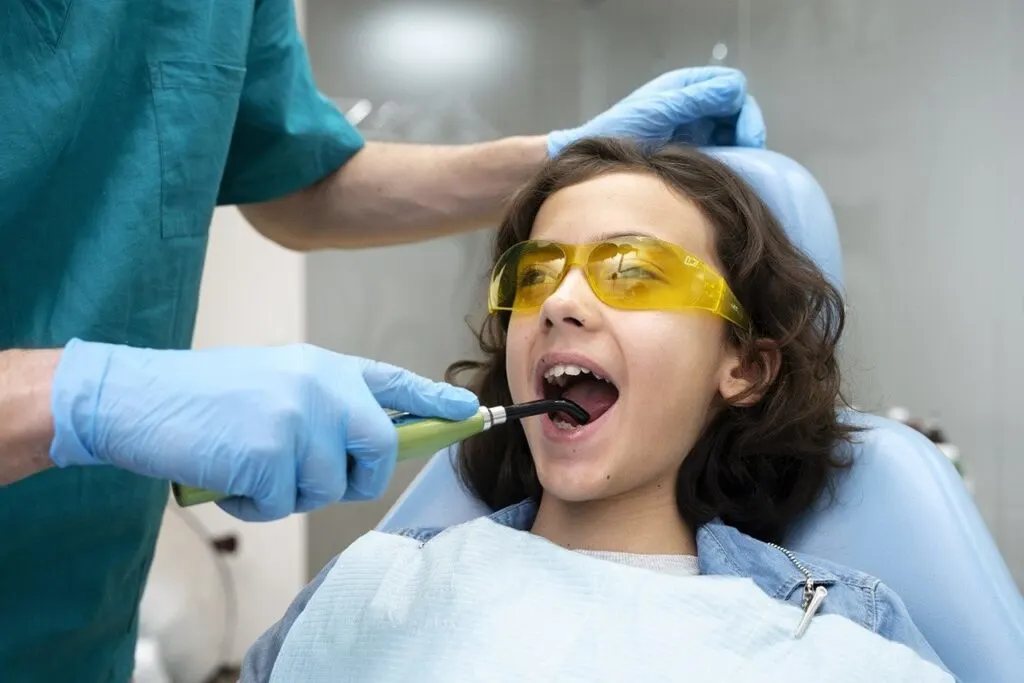This post contains affiliate links. I only recommend products I use and love. Read the full disclosure here
Last Updated on March 12, 2024 by Alaina Bullock
Part of being a parent is to help your child to learn to stay healthy. One of the aspects of keeping your child healthy is teaching your child about healthy eating and how nutritious food is connected to good dental health. Here are some guidelines on helping your children learn the connection between healthy eating and oral hygiene.

Begin by Teaching Dental Health Practices
You can make dental health part of your child’s daily routine from the beginning of their life. Help your child get used to the sensation of cleaning their teeth and gums even before they eat solid foods.
Use a soft, moist cloth to wipe their gums gently every morning and evening. Then, once your baby begins to eat solid food, you can use a finger brush (a rubber device with gentle toothbrush bristles that fits over your finger) to clean their gums and emerging teeth.
After your baby’s first tooth comes through, you can then use a small toothbrush with soft bristles. Be sure to explain what you’re doing to your child using simple words, and make it sound like you’re having fun. Your child’s natural curiosity will cause them to want to copy you by cleaning their own teeth.
You can then begin by allowing them to take charge of their dental care by brushing their teeth under your supervision. On average, your kids should brush their teeth every morning by the time they reach age eight.
Encourage Independence and Nutritional Teaching
Once your child begins using a toothbrush, they should use fluoride toothpaste to promote cavity prevention. There are plenty of kid-friendly toothpaste flavors, so you shouldn’t have to work too hard to convince your kids to use toothpaste.
Along with their growing independence by brushing their teeth, this is also the time to teach elementary principles of general and dental health.
Begin with a demonstration of handwashing before meals and after using the bathroom, and reinforce healthy habits by telling kids how those habits will help them to “grow up big and strong.”
This time period will also be the right time to begin healthy eating habits. Choosing fruits and vegetables for snacks can be the norm in your home, and it can be reinforced by your words that carrot sticks and apples are good for their teeth.
Prepare healthy foods at home containing lean proteins, whole grains, healthy fats, and vegetables. Avoid the temptation to grab take-out meals, although, according to U.S. Floss, 75% of people admit they enjoy take-out due to convenience.
Dental Health Becomes their Goal
As your children grow more teeth, and their teeth begin touching, you should teach them to floss. You will have to floss for your child or help them to floss until they are about age 10. Be sure they understand the importance of flossing. After all, according to the Facts website, when you don’t floss, you’ll miss out on cleaning 40% of your teeth.
Children should first visit the dentist when they’re around one year old. As they age, you can keep reinforcing the concept of their dentist as a health partner. Dentists who care for children are trained to reinforce those principles of dental health that you’ve been teaching them about brushing, flossing, and nutrition.
The quest to help your child develop and maintain good dental health can pay off by knowing your child has the chance to keep their teeth healthy for life. The more independently they can care for their teeth, the more comfortable they will feel with the healthy habits you taught them. Every time you see them smile, you can feel content because your loving preparation will have been part of your child’s dental health.
